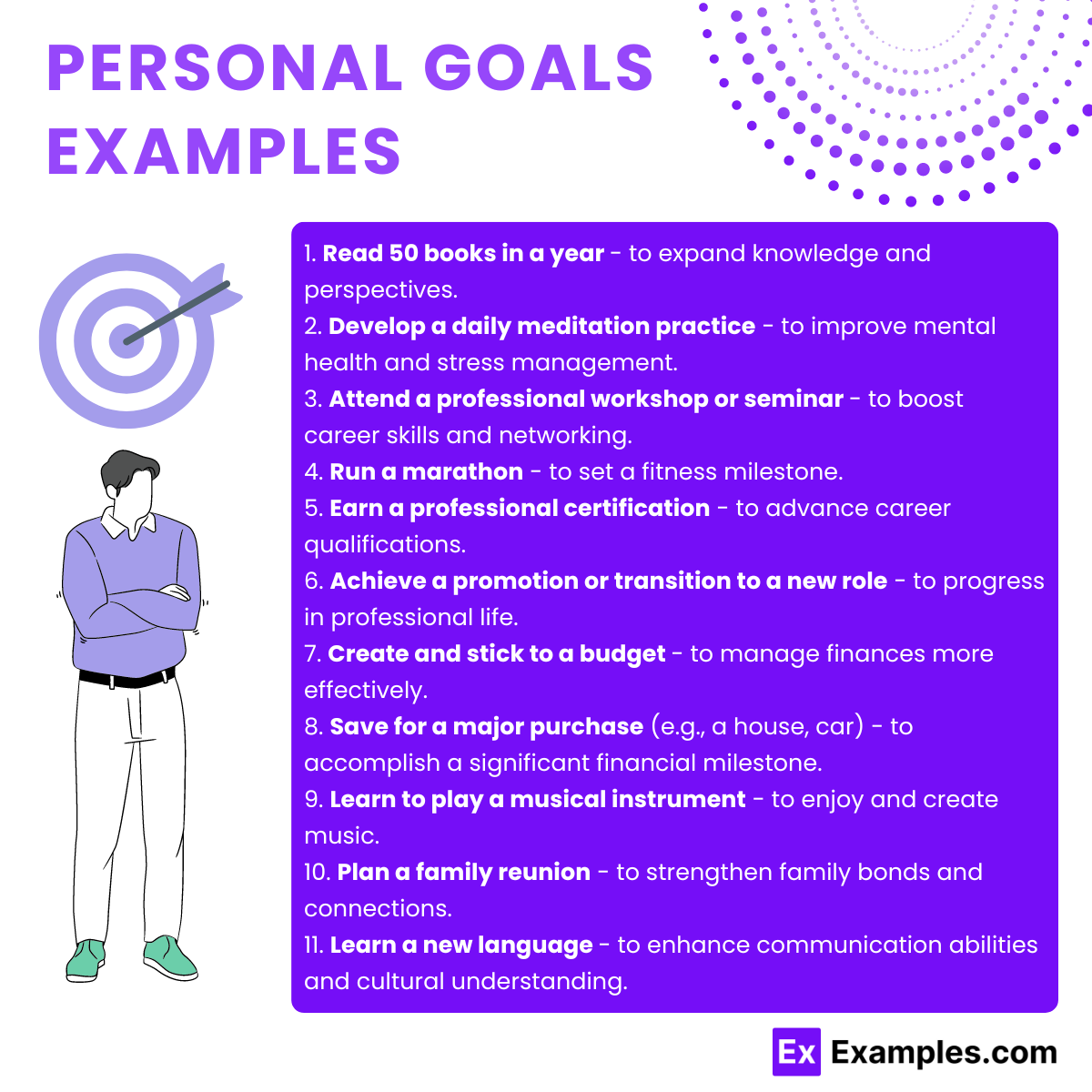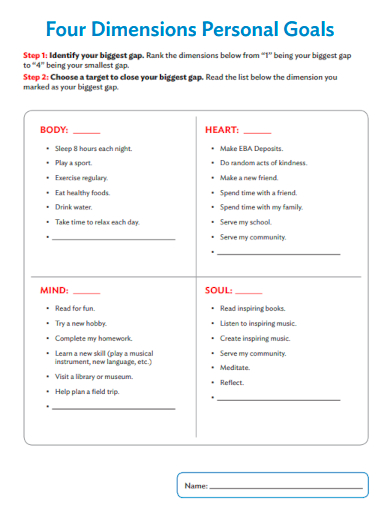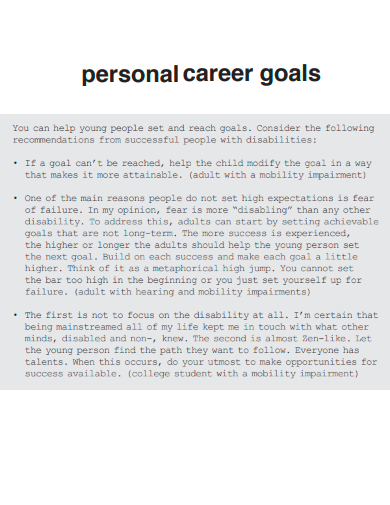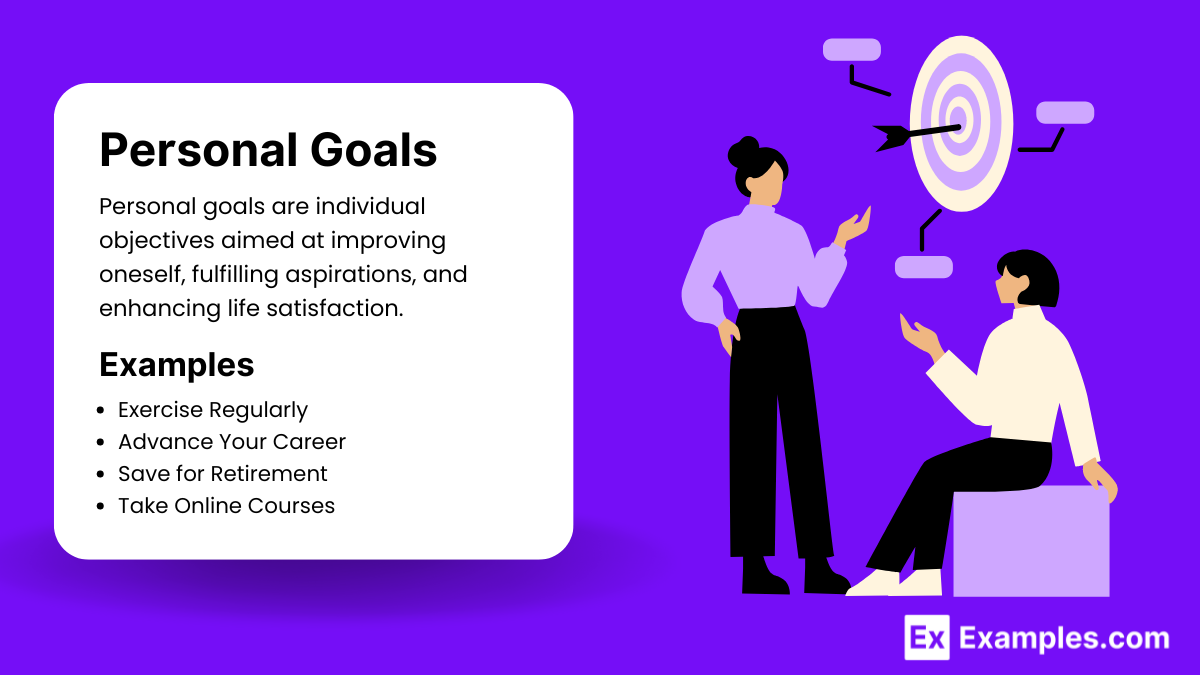100+ Personal Goals Examples
If what you want to achieve in the year 2024 is personal developmental growth, then it would be ideal for you to make some personal goals. Now, you might think that you are going to face another problem and that is what could be some personal goal ideas, both long-term goals, and short-term goals, that you might possibly want to achieve in the new year? Worry not, for here are eighteen personal goal ideas that will give you a heads up in the new year.
What Are Personal Goals?
Personal goals are a list of specific objectives or achievements that you would set for yourself to accomplish at a specific timeline. These goals are based mainly on the desires and values of an individual. Personal goals can range from short term goals, long term goals, and lifetime goals. By completing these specific goals you set for yourself, you can also learn a new skill, grow your career, or love a new hobby.
Personal Goals Examples

Health Goals
- Exercise Regularly: Aim to exercise at least 30 minutes a day, five times a week.
- Eat Healthily: Incorporate more fruits, vegetables, and whole grains into your diet.
- Sleep Better: Establish a consistent bedtime routine to improve sleep quality.
- Drink More Water: Set a goal to drink at least eight glasses of water a day.
Career Goals
- Advance Your Career: Obtain a certification or degree relevant to your field.
- Improve Skills: Learn a new software tool or technique that will enhance your job performance.
- Network More: Attend industry meetings or join professional groups to make new connections.
- Achieve a Promotion: Set specific performance goals to reach the next level in your organization.
Financial Goals
- Save for Retirement: Contribute regularly to a retirement account.
- Create a Budget: Track your spending and set limits to better manage your finances.
- Reduce Debt: Plan to pay off credit card debt or student loans.
- Invest Wisely: Learn about stocks, bonds, or real estate to diversify your investments.
Educational Goals
- Read More: Aim to read one book per month.
- Take Online Courses: Enhance your knowledge or skills through online learning platforms.
- Attend Workshops: Participate in workshops to gain hands-on experience in your interests.
- Earn a Degree: Enroll in a program that will further your professional or personal interests.
Personal Development Goals
- Learn a New Language: Dedicate time each day to practice a new language.
- Improve Public Speaking: Join a speaking club to enhance your presentation skills.
- Volunteer Regularly: Commit time to a cause or organization you care about.
- Maintain a Journal: Write daily to reflect on experiences and grow personally.
Personal Goals Examples for Life
- Save enough for a down payment on a house.
- Build an emergency fund covering six months of expenses.
- Learn a new language fluently.
- Travel to 10 different countries.
- Write and publish a book.
- Achieve a healthy work-life balance.
- Volunteer regularly at a local charity.
- Learn to play a musical instrument.
- Start a family.
- Complete a marathon.
- Invest in a retirement fund.
- Develop a sustainable lifestyle.
Personal Goals Examples for Students
- Achieve a 4.0 GPA for the semester.
- Complete all assignments at least one day before they are due.
- Join a university club or society.
- Apply for and secure an internship.
- Read one educational book per month.
- Build a strong professional network.
- Participate in a student exchange program.
- Develop effective study habits.
- Maintain a daily journal.
- Improve public speaking skills.
- Learn a coding language.
- Secure a scholarship.
Personal Goals Examples for Employees
- Earn a professional certification.
- Achieve all quarterly performance goals.
- Lead a major project.
- Improve productivity by 20%.
- Expand professional network within the industry.
- Mentor a junior colleague.
- Attend a leadership training program.
- Receive a positive performance review.
- Develop a new skill relevant to the job.
- Participate in all team meetings actively.
- Achieve a promotion.
- Enhance collaboration skills.
Personal Goals Examples for Work
- Increase sales by 15% over the next quarter.
- Reduce operational costs by 10%.
- Implement a new customer relationship management system.
- Develop a comprehensive competitor analysis report.
- Improve employee satisfaction scores.
- Streamline the inventory management process.
- Enhance the customer service protocol.
- Foster a positive work environment.
- Complete a professional development course.
- Establish a new departmental strategy.
- Launch a successful marketing campaign.
- Optimize the workflow process.
Personal Goals Examples for Interview
- Communicate career objectives clearly.
- Showcase problem-solving skills through specific examples.
- Demonstrate knowledge of the industry.
- Express enthusiasm for the role and company.
- Highlight teamwork and leadership experiences.
- Discuss professional achievements and learning experiences.
- Convey adaptability to various work environments.
- Illustrate commitment to professional growth.
- Negotiate a competitive salary effectively.
- Ask insightful questions about the company’s future.
- Follow up with a thank-you email post-interview.
- Exhibit confidence and professionalism throughout the interview.
Personal Goals Examples for Business
- Launch a new product line.
- Expand business operations to another country.
- Increase brand awareness through social media.
- Establish partnerships with other businesses.
- Reach a revenue milestone within the next year.
- Diversify the company’s product offerings.
- Reduce environmental impact of operations.
- Secure funding from investors.
- Open a new office location.
- Enhance customer loyalty programs.
- Develop a robust e-commerce platform.
- Implement data-driven decision-making processes.
Personal Goals Examples for Health
- Lose 10 pounds in a healthy manner.
- Run a 5k without stopping.
- Incorporate more vegetables and fruits into diet.
- Quit smoking.
- Meditate for 15 minutes daily.
- Drink eight glasses of water a day.
- Complete a month without sugar.
- Sleep at least 7 hours each night.
- Take a yoga class twice a week.
- Have a dental check-up twice a year.
- Walk 10,000 steps daily.
- Schedule annual health check-ups.
Personal Goals to Set for Yourself
Personal Development Goals
- Learn a new skill: Whether it’s coding, cooking, or carpentry, learning something new can be incredibly rewarding.
- Read more: Set a goal to read a certain number of books each year to expand your knowledge and improve your language skills.
- Improve your public speaking: Joining a group like Toastmasters or taking a public speaking course can boost your confidence and communication skills.
Health and Fitness Goals
- Regular exercise: Aim for specific days per week or minutes per day to stay physically active.
- Eat healthier: Set goals to incorporate more fruits, vegetables, and whole foods into your diet.
- Run a marathon: Train for and complete a long-distance running event, like a marathon or half-marathon.
Career Goals
- Gain a professional certification: Enhancing your qualifications can open doors to new job opportunities and career advancements.
- Improve your productivity: Set objectives to manage your time more effectively at work.
- Network more effectively: Aim to meet a certain number of new people in your industry each month.
Financial Goals
- Save a specific amount of money: Whether it’s for retirement, a house, or an emergency fund, setting a clear financial goal can help you secure your future.
- Invest in the stock market: Learn about and begin investing in stocks or mutual funds to grow your wealth.
- Reduce debt: Create a plan to pay off credit cards, student loans, or other debts.
Relationship Goals
- Spend more quality time with family and friends: Set aside specific times for social activities or family gatherings.
- Strengthen your romantic relationships: Commit to regular date nights or couples’ activities to keep the bond strong.
- Make new friends: Join clubs or groups that align with your interests to meet new people and expand your social circle.
Why do we set personal goals?
Setting personal goals is crucial because it provides a clear direction and purpose, helping individuals to focus their efforts and resources effectively. Goals act as motivational forces, driving people to overcome obstacles and persist in the face of challenges. They help in measuring progress and achieving personal growth, satisfaction, and self-improvement. Additionally, goal setting aids in prioritizing tasks, managing time efficiently, and making informed decisions, ultimately leading to a more structured and fulfilling life. By defining what one wants to accomplish, goals also foster a sense of personal responsibility and accountability.
Variations in Personal Goals
Short-term Goals
Short-term goals are typically achieved relatively quickly, often within a few weeks to a year. They are usually set to meet urgent or straightforward objectives.
Mid-term Goals
These goals are typically planned to be achieved within one to three years. They often involve preparations for significant expenditures like vacations or educational advancements.
Long-term Goals
Long-term goals span over three years or more and involve sustained efforts. Common examples include purchasing a property, reaching key career benchmarks, or preparing for retirement.
Types of Personal Goals
The most common type of goals are personal goals. But did you know that there are also other types of goals that you may or may not have heard of? The other types of goals are: career goals, leadership goals, relationship goals, smart goals, business goals, financial goals, and academic goals. These Personal goals provide direction and motivation, helping people shape their futures according to their values, aspirations, and priorities. Here’s a closer look at some common types of personal goals:
Personal Development Goals
These are goals focused on improving oneself, such as learning new skills, reading more books, or mastering a new hobby. They aim to enhance personal growth and self-awareness.
Career Goals
These involve aspirations related to one’s professional life, such as achieving a certain position, earning a specific qualification, or starting a new business. They are often measurable and time-bound.
Educational Goals
Educational goals are related to academic achievements, such as completing a degree, obtaining certifications, or mastering a new field of study. They are crucial for long-term career development.
Financial Goals
Financial goals might include saving for retirement, investing in stocks, buying a home, or eliminating debt. These goals help secure financial stability and independence.
Health Goals
Health-related goals can range from losing weight, eating healthier, or running a marathon, to more serious ones like managing a chronic illness. These goals focus on physical, mental, and emotional well-being.
Relationship Goals
These goals focus on building or improving relationships, whether with family, friends, or romantic partners. Examples include resolving conflicts, spending more quality time with loved ones, or building a strong support network.
Spiritual Goals
Spiritual goals involve seeking a deeper understanding of one’s faith or beliefs, practicing mindfulness, or engaging in activities that align with one’s spiritual values.
How to Set Personal Goals
Setting personal goals is a critical step in achieving success and fulfillment in various aspects of life. Here’s a structured approach to help you set effective personal goals
Step 1: Reflect on Your Values and Aspirations
- Spend some time thinking about what is most important to you. Consider your passions, values, and the long-term vision you have for your life.
- Identify areas where you feel unsatisfied or where you desire change.
Step 2: Choose Specific Areas of Focus
- Based on your reflections, select key areas to focus on, such as career, education, health, or relationships.
- Ensure these areas align with your overall life values and aspirations.
Step 3: Use the SMART Criteria
- Set goals that are Specific, Measurable, Achievable, Relevant, and Time-bound.
- For example, instead of setting a vague goal like “get healthy,” a SMART goal would be “lose 10 pounds in 3 months by exercising three times a week and eating a balanced diet.”
Step 4: Write Down Your Goals
- Document your goals in a journal, on a digital notepad, or a goal-setting app.
- Writing down goals increases your commitment and helps you remember them.
Step 5: Break Goals into Manageable Steps
- Break each goal into smaller, actionable steps. For instance, if your goal is to complete a professional certification, your steps might include enrolling in the course, scheduling study times, and completing practice exams.
- Set deadlines for each step to keep yourself on track.
Step 6: Review and Adjust Regularly
- Regularly review your goals and progress. This can be done monthly or quarterly.
- Be flexible and willing to adjust your goals as circumstances change or as you gain more insight into what you truly want.
Step 7: Seek Support
- Share your goals with supportive friends, family, or mentors who can offer encouragement and accountability.
- Consider joining groups or communities that share similar goals.
Step 8: Celebrate Achievements
- Celebrate your successes, no matter how small. This reinforces positive behavior and keeps you motivated.
- Reflect on what you’ve learned from the experience and how it has contributed to your personal growth.
How to Write Your Own Personal Goals
Are you planning on personal goals you want to achieve for 2023? May these be short term or long term. The important thing is to understand what your personal goals are and how you can approach them. Here are steps to write your own personal goals.
Step 1: Reflect on Your Goals and Objectives
It is always difficult to have to know what goals you want to achieve and for how long. In order for you to start with your goals, you must first reflect on the values you would want to attain when doing these goals. Take into consideration on what you want to achieve in life or for a moment.
Step 2: List Down Your Goals
List down your goals. Be specific with what these are in order for you to track the progress. Apart from making a personal timeline of your goals, it is always best to see whether or not your goals matches the SMART goal format. Measurable, attainable, and specific enough.
Step 3: Break It Down
Break down the goals into smaller and possible steps. If you do not break it down, it can be so overwhelming to take a large goal and do it then and there. To be able to manage it in a better manner, break them down to smaller goals to achieve them.
Step 4: Make a Timeline for Your Goals
Timelines are important. Holding a good and practical deadline for your goals will help you stay on track with your goals. Whatever type of goal you have, you must set up a practical timeline in order for you to be able to reach the goal you intended.
Best Practices for Personal Goal-Setting
Define Clear and Specific Goals
Setting specific goals helps you understand exactly what you are aiming for. Clear goals should answer the ‘what’, ‘why’, and ‘how’ of your aspirations. For instance, instead of setting a goal to “lose weight”, a more specific goal would be “lose 10 pounds in 3 months by exercising four times a week and eating fewer than 1800 calories per day.”
Make Goals Measurable
Measurable goals allow you to track your progress. Define criteria for measurement like time, quantity, or certain milestones. This not only provides motivation as you see the progress being made but also helps in adjusting the plan if the progress is not as expected.
Ensure Goals Are Achievable
While ambition is important, your goals should be realistically achievable. Setting unattainable goals can lead to frustration and loss of motivation. Consider your current resources, constraints, and skills when setting goals to ensure they are within reach.
Set Relevant Goals
Goals should be relevant to your broader life plans and values. They should contribute towards your long-term objectives and align with your priorities. This relevance ensures that you remain motivated and committed to achieving them.
Time-Bound Goals
Setting deadlines is crucial as it creates a sense of urgency and helps in prioritizing tasks. Without a timeframe, there’s a risk of your goals being perpetually postponed. Determine a realistic end-date for each goal to foster a commitment to completing it on time.
Write Down Your Goals
Documenting your goals in a physical or digital format can make them feel more concrete. It also helps in revisiting and reviewing them regularly, which is important to keep your focus and make necessary adjustments.
Review and Adjust Regularly
Your circumstances and priorities can change, and your goals should be flexible enough to accommodate those changes. Regular reviews of your goals allow for adjustments in your strategies or timelines and reaffirm your commitment to the outcomes you want to achieve.
Celebrate Milestones
Recognizing and celebrating progress is key in maintaining motivation throughout your journey toward reaching your goals. Set milestones within your goals and celebrate when you reach them. This positive reinforcement makes the journey enjoyable and rewarding.
Ways to Achieve Personal Goals
Set Clear and Specific Goals
It’s crucial to define what you want to achieve clearly and specifically. Vague goals are harder to pursue because they lack a clear target. Instead, make your goals SMART: Specific, Measurable, Achievable, Relevant, and Time-bound. This approach provides a structured blueprint that can guide your efforts.
Develop a Plan
Once your goals are set, outline the steps you need to take to achieve them. This plan should include smaller, incremental goals that lead up to the larger objective. Break your plan into actionable tasks and set deadlines for each, ensuring a consistent move towards your end goal.
Prioritize Tasks
Focus on tasks that will have the most impact on your goals first. This might mean tackling the most challenging tasks when you’re most alert or prioritizing tasks that will enable other steps to proceed more smoothly.
Track Progress
Keep a record of your progress. This can help you stay motivated and adjust your strategy if needed. Tools like journals, apps, or simple checklists can be effective for monitoring your advancements and reflecting on your journey.
Stay Flexible
Adaptability is key to achieving goals, as circumstances can change unexpectedly. Be prepared to reassess and modify your plans as required. This flexibility can help you overcome challenges and exploit new opportunities that align with your goals.
Seek Support
Don’t hesitate to seek help from friends, family, or mentors. They can offer guidance, encouragement, and accountability, which can be tremendously helpful. Sometimes, just knowing that others are rooting for you can increase your motivation.
Maintain Self-Discipline
Achieving personal goals requires consistent effort. Develop self-discipline by sticking to your plan, even when it’s tempting to stray. Building routines and habits that support your goals can also make self-discipline easier.
Reward Yourself
Set up rewards for reaching milestones. This not only makes the journey more enjoyable but also reinforces your motivation to push through to the next stages of your goal.
Importance of Personal Goal-Setting
Clarity and Direction
Setting personal goals provides clarity and direction in life. It helps you determine what you truly want to achieve, guiding your actions and decisions towards these objectives. This can make daily activities more meaningful and aligned with your broader life ambitions.
Motivation and Commitment
Goals can significantly boost your motivation. By setting targets, you create a sense of commitment to pursue them, which can keep you motivated even during challenging times. This motivation can drive you to overcome obstacles and persist in your efforts.
Measuring Progress
Goals allow you to measure progress. By establishing clear, measurable objectives, you can see how far you’ve come and what remains to be done. This feedback loop is crucial for adjusting your strategies and efforts to ensure you stay on track.
Personal Growth
Pursuing personal goals often leads to growth and development. Challenges you encounter along the way will teach you new skills, increase your resilience, and enhance your understanding of your capabilities and limits.
Sense of Accomplishment
Achieving your goals provides a profound sense of accomplishment. This success can boost your self-esteem and happiness, contributing to a more positive self-image and a greater sense of purpose in life.
1. Four Dimensions Personal Goals

xavier.edu
2. Personal Career Goals

washington.edu
Expert Tips for Personal Goal Development
Start with Clear, Specific Objectives
Define your goals clearly: Start by articulating what you want to achieve in precise terms. For example, instead of saying “I want to get fit,” specify “I aim to exercise for 30 minutes at least four times a week and eat five servings of fruits and vegetables daily.”
Set Measurable Milestones
Break it down: Large goals can be overwhelming, so break them into smaller, manageable milestones. If your goal is to write a book, set weekly targets for words or pages.
Be Realistic
Assess your resources: Ensure that your goals are attainable given your current resources, such as time, money, and skills. Setting unrealistic goals can lead to frustration and burnout.
Embrace Flexibility
Adjust as needed: Life is unpredictable, and flexibility can help you navigate changes. Be willing to adjust your goals based on new information or circumstances.
Stay Committed
Maintain motivation: Keep your motivation high by reminding yourself why these goals matter to you. Celebrate small victories along the way to stay encouraged.
Seek Support
Build a support network: Share your goals with friends, family, or a mentor who can provide encouragement and accountability. Sometimes, just knowing someone else is rooting for you can make a big difference.
Review and Reflect
Regularly evaluate your progress: Set aside time regularly to reflect on your progress. This can help you understand what’s working, what’s not, and what changes might be necessary to succeed.
Why are personal goals important?
Setting personal goals provides direction, motivation, and a measure of progress in one’s life.
How do I set personal goals?
Identify what you want to achieve, break it down into manageable tasks, and set deadlines for these tasks.
What are examples of personal goals?
Examples include advancing in a career, learning a new skill, or improving physical health.
How often should I review my personal goals?
Reviewing personal goals regularly, such as monthly or quarterly, helps adjust plans and stay on track.
What makes a good personal goal?
A good personal goal is specific, measurable, achievable, relevant, and time-bound (SMART).
How can I stay motivated to achieve my personal goals?
Maintain motivation by setting clear rewards, tracking progress, and staying flexible with your methods.
What challenges might I face when pursuing personal goals?
Common challenges include lack of time, motivation, resources, and unexpected life events.
How do personal goals impact mental health?
Well-set goals can boost mental health by providing purpose, control, and accomplishment.
Can personal goals change over time?
Yes, personal goals often evolve based on life circumstances, experiences, and changing priorities.



